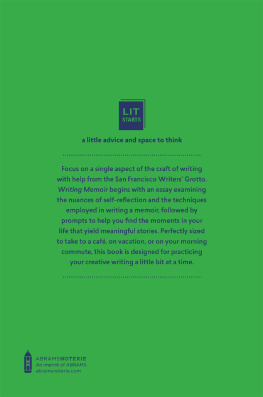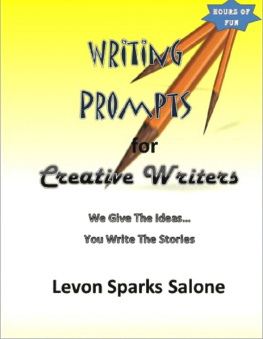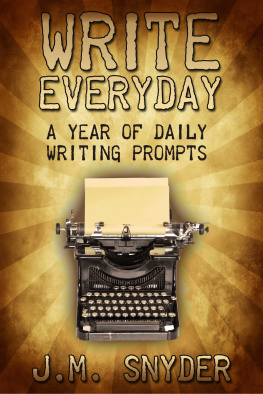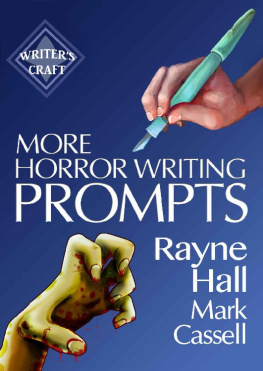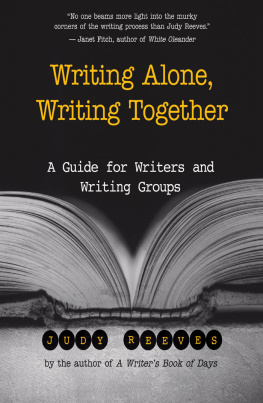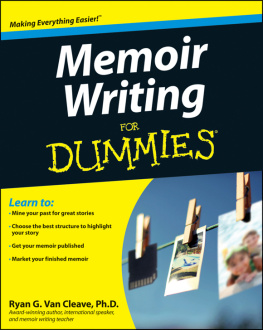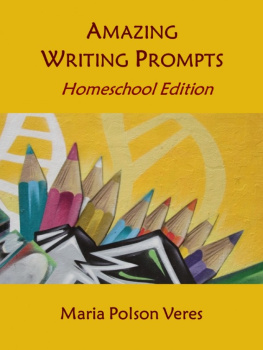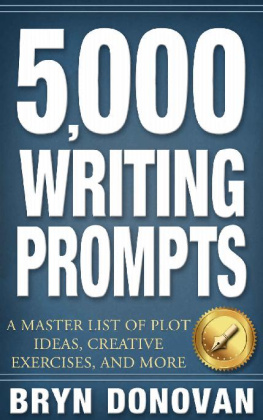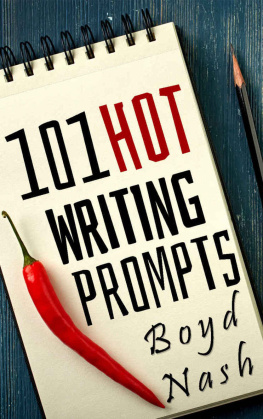The San Francisco Writers’ Grotto - Writing Memoir: A Book of Writing Prompts
Here you can read online The San Francisco Writers’ Grotto - Writing Memoir: A Book of Writing Prompts full text of the book (entire story) in english for free. Download pdf and epub, get meaning, cover and reviews about this ebook. year: 2022, publisher: Abrams Noterie, genre: Religion. Description of the work, (preface) as well as reviews are available. Best literature library LitArk.com created for fans of good reading and offers a wide selection of genres:
Romance novel
Science fiction
Adventure
Detective
Science
History
Home and family
Prose
Art
Politics
Computer
Non-fiction
Religion
Business
Children
Humor
Choose a favorite category and find really read worthwhile books. Enjoy immersion in the world of imagination, feel the emotions of the characters or learn something new for yourself, make an fascinating discovery.
- Book:Writing Memoir: A Book of Writing Prompts
- Author:
- Publisher:Abrams Noterie
- Genre:
- Year:2022
- Rating:5 / 5
- Favourites:Add to favourites
- Your mark:
- 100
- 1
- 2
- 3
- 4
- 5
Writing Memoir: A Book of Writing Prompts: summary, description and annotation
We offer to read an annotation, description, summary or preface (depends on what the author of the book "Writing Memoir: A Book of Writing Prompts" wrote himself). If you haven't found the necessary information about the book — write in the comments, we will try to find it.
Writing Memoir: A Book of Writing Prompts — read online for free the complete book (whole text) full work
Below is the text of the book, divided by pages. System saving the place of the last page read, allows you to conveniently read the book "Writing Memoir: A Book of Writing Prompts" online for free, without having to search again every time where you left off. Put a bookmark, and you can go to the page where you finished reading at any time.
Font size:
Interval:
Bookmark:
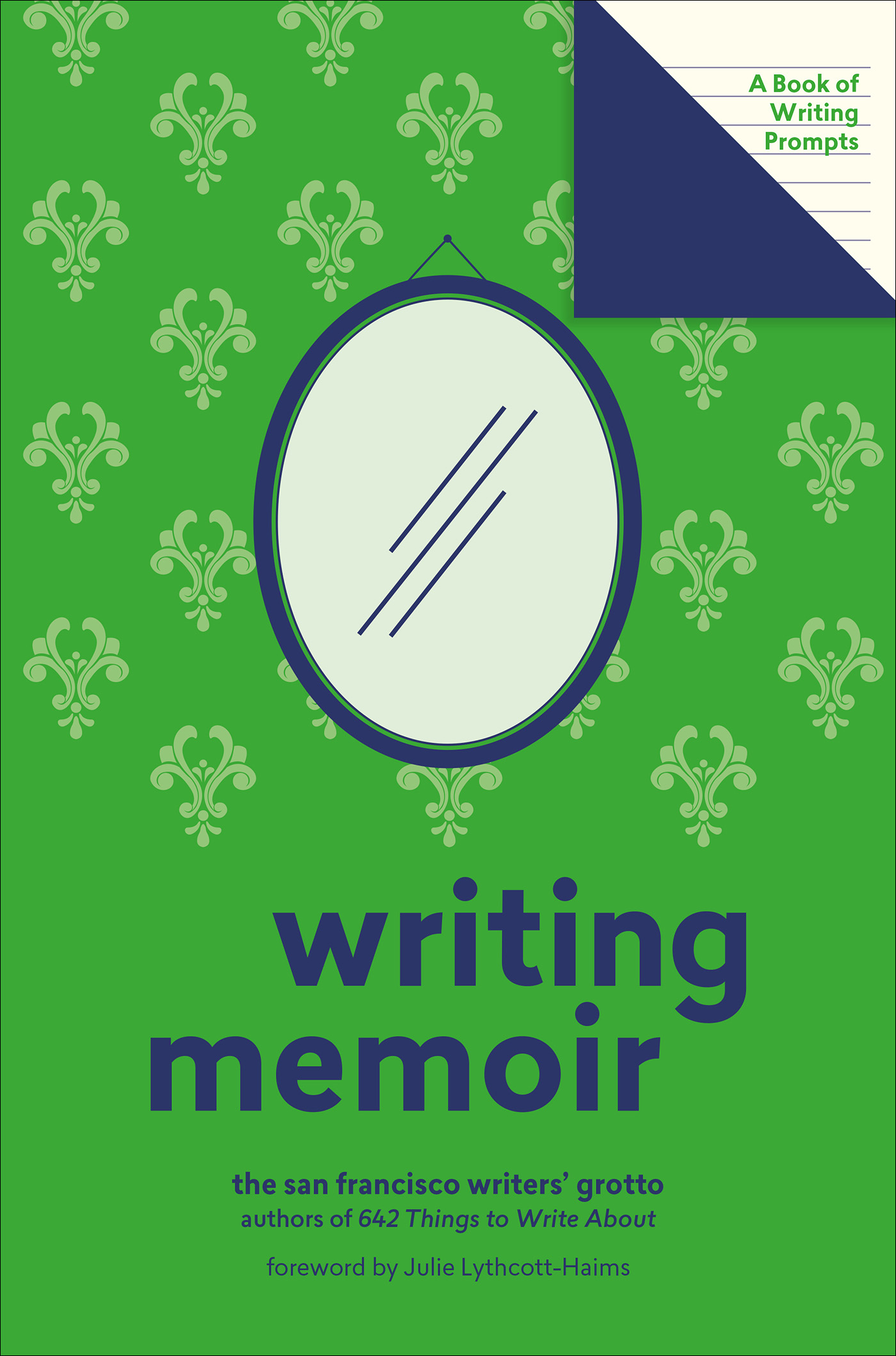

Memoirists take on the risks associated with telling truths in public, and thus are the bug lighters of the literary world. Critics love to pick on usthey equate the genre to a gathering of nudists whose bodies no one wants to see. Family and friends can be critics, toothey may not like the secrets being revealed or the way theyve been depicted on the page. (A worthy retort, satisfying in the moment: If you didnt want to be in the book, you shouldve been nicer.) But whether memoirists are lauded as heroes or reviled as knaves is beside the point. The truth is worth telling. And sometimes the truth hurts.
But lets rewind. First, lets establish a definition for what memoir is. To me, memoir is a true account of some aspect of ones life. It is not autobiography, which is generally reserved for humans who know during their lifetimes that they are destined to become historical figures. Both forms aim to tell the truth of things as remembered by the subject, and both are vulnerable to accusations that the narrative veered toward make-believe or covered a subject not worthy of another humans time. But they differ in their scope. A memoir covers a particular experience, memorable period, or lesson learned; an autobiography tells a persons entire life. A person can write only one autobiography but can write innumerable memoirs. (A recent headline accompanying the publication of her third memoir screamed, Joyce Maynard is still oversharing.)
Its also worthwhile to compare memoir to its sister, the novel. Whereas in a novel the reader is aware of three distinct points of viewthe author who writes the book, the perspective from which the story is told, and the main character or protagonist who lives the storyin memoir, the author, narrator, and protagonist are one and the same. This requires a bit of psychological sorting, and embedded in the complexity is a critical lesson: A memoirists central preoccupation is determining what the self knew (and when) and how the narrator should reveal the protagonists journey to the reader, while doing a delicate dance with the changing nature of memory.
Unlike novelists, memoirists choose not to invent a world where anything goes and where the author will have complete deniability. Our oath is to the truth. Yet truth is not as ironclad a concept as it may seem. Think of it as fact versus perception; this seems like a clear distinction, yet is my perception not the pencil that records the facts of my life?
Following Thanksgiving dinner, for example, were you to ask all of your relatives to spend half an hour writing down what happened during the meal, you would get as many versions of that truth as there are relatives. Each of us sees things differently, through the lens of our experiences, biases, fears, and needs. The Thanksgiving scenewho arrived when, who sat where, the food, the conversation, and what caused that clatter in the kitchenis now part of the past. The only means we have for resurrecting it are the memories of the humans who were there. Memory, therefore, is a representation (a re-presentation). Even if the whole thing had been recorded and watched on instant replay in the family room, we might know the what of what happened, but we still wouldnt know the why and the how. Why Uncle Rufus showed up late and how Mom felt when she heard him come through the door. Why Dad had a smirk on his face. Why cousin Iona grew silent. How Emmett felt as he sat there. How, when all was said and done, there was a pile of potatoes on the kitchen floor. Is anyones conclusion on these matters more right or wrong than anyone elses? Not really.
Things are never exactly as they seem, in other words. The surrealist painter Ren Magritte sought to teach this by writing Ceci nest pas une pipe (This is not a pipe) under his famous painting of a pipe, by which he meant: This painting is not the same thing as the object that was painted. Think of memoir the same way: always one step removed from the experience it purports to depict. Moreover, we are biased either toward or against ourselves and others; we cant know what we do not know and often dont know why we did something, let alone what motivated someone elses behavior. And what we do know is, by definition, only what our memory has chosen to retain for us. Memoirists aim for accuracy, honesty, and fairness, knowing certainty is impossible to come by.
Since memoir covers a piece of a life rather than an entire life, a crucial consideration is whether the memories are ripe for the telling or should be allowed to age with time. Some memoirs are written during the thing itself, or right after. Some are written with the benefit of distance from the central events, which allows the memoirist to bring deeper wisdom and analysis to the story even at the expense of depleting memory.
For example, Frederick Douglass had a clear intention and an urgent need to write his memoirNarrative of the Life of Frederick Douglass, an American Slaveshortly after securing his freedom, so he might draw further attention to slaverys cruelty and hasten its dissolution. From the start, he is aware of the memoirs potential for harm, too. Although he primes the reader to hear the harrowing tale of escape, in the end he explicitly states that he will not recount those details so as not to jeopardize the efforts of other slaves seeking freedom. His refusal to share what would no doubt have been the books most compelling scene underscores for readers how much is at stake.
In The Year of Magical Thinking, Joan Didion endeavors to put emotional trauma under the microscope. She writes her memoir while fumbling through her own bewilderment in the immediate aftermath of her husbands death and her daughters fight with a mysterious life-threatening illness. She chose to tap her emotions while they were fresh and raw so that she didnt lose them to memory. She aimed to capture the chaos of right now on the page so that the reader can come as close as possible to understanding what it is like to experience such things rather than offering a more analytical and dispassionate look at what it was like.
Cheryl Strayed took seventeen years to excavate meaning from the biggest events of her past. Her memoir, Wild: From Lost to Found on the Pacific Crest Trail, is, on the surface, about a grueling physical quest; on a deeper level, its about her struggle to sort out her grief over her mothers death and her own serial betrayals and drug use, as well as to understand who she is, why shes done what shes done, and how she will make herself whole again.
Alison Bechdel waited twenty-six years after her fathers suicide to write the graphic memoir Fun Home: A Family Tragicomicenough time for the shame and bewilderment over her strange, emotionally controlled childhood to give way to understanding, empathy, and even kinship toward her profoundly flawed father.
Now its your turn. Move to a desk and, with this book and a pencil or pen, summon the best memories youve got. The prompts herein will help you. Dont worry about the order of things, or how youll link them together. Start by giving airtime to the memories that just wont quitthe ones that form the basis for your impulse to write memoir. Next, be curious about investigating the deeper story and harvest the best memories from conversations, interactions, events, experiences, inner feelings, and dreams. Press on your joy and moments of triumph and ask yourself why those times were so eventfulthey are clues as to what matters most to you. Also press on what hurts in order to understand what you fear. The material you cant bear to face or write about could ultimately form some of your most impactful writing. See if you can go there. If you dont, you might make the mistake of telling the story that stands in front of the story that actually wants to be told. Dig up not just what happened to you but what you did to others. Tell yourself you can always take the hard bits out before anyone seesfor that is trueand it will also give you time to get comfortable seeing that stuff on the page.
Font size:
Interval:
Bookmark:
Similar books «Writing Memoir: A Book of Writing Prompts»
Look at similar books to Writing Memoir: A Book of Writing Prompts. We have selected literature similar in name and meaning in the hope of providing readers with more options to find new, interesting, not yet read works.
Discussion, reviews of the book Writing Memoir: A Book of Writing Prompts and just readers' own opinions. Leave your comments, write what you think about the work, its meaning or the main characters. Specify what exactly you liked and what you didn't like, and why you think so.

